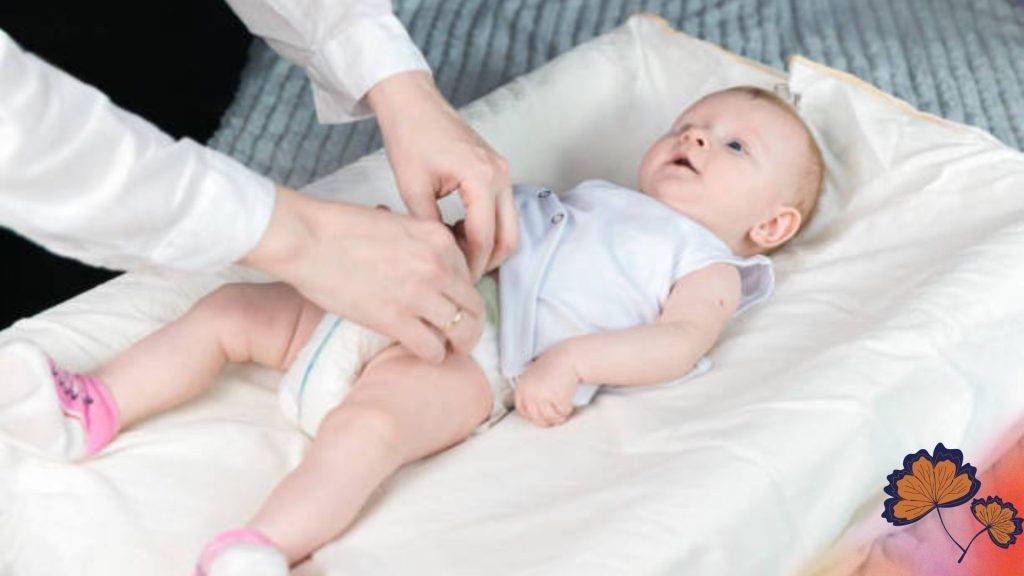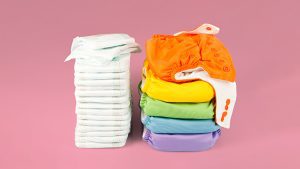Why do babies pee when changing diapers? Changing a baby’s diaper is a routine task for parents and caregivers, but it’s not uncommon to experience an unexpected spray of urine during the process. While this can be frustrating, understanding why babies pee when changing their diapers can help mitigate the inconvenience and ensure a smoother diaper-changing experience. In this comprehensive article, we’ll explore the various reasons behind this phenomenon, how to prevent it, and tips for dealing with it when it happens.
1. The Physiology of Infants
To understand Why do babies pee when changing diapers? it’s essential to grasp some basic aspects of infant physiology:
A. Immature Bladder Control
Newborns and young infants have underdeveloped nervous systems. This means they lack the bladder control that older children and adults have. In the first few months of life, babies urinate frequently as their small bladders fill up quickly. They cannot hold urine for long periods, so when the diaper is removed, the change in temperature and sensation can trigger urination.
B. Moro Reflex
The Moro reflex, or startle reflex, is a primitive reflex present in newborns. It is an involuntary response to sudden stimuli, such as a loud noise or a sudden change in position. When a baby’s diaper is removed, the exposure to cool air can trigger the Moro reflex, causing them to startle and, in some cases, urinate.
C. Temperature Sensitivity
Babies are highly sensitive to temperature changes. When a diaper is removed, the sudden exposure to cooler air can stimulate the nerve endings in the baby’s skin, leading to an involuntary release of urine. This is why many parents notice that their baby pees as soon as the diaper is off.
2. The Role of Timing and Routine

A. Diaper Changing Routine
Establishing a consistent diaper-changing routine can help reduce the likelihood of unexpected urination. Babies thrive on routine, and regular diaper changes can help them become accustomed to the process, potentially reducing the surprise factor that can trigger peeing.
B. Timing of Feeding and Diaper Changes
Babies often urinate shortly after feeding. If diaper changes are timed right after a feeding session, it increases the chances of encountering a pee incident. To avoid this, it’s advisable to wait a little while after feeding before changing the diaper. This allows the baby to urinate before the diaper is removed.
3. Techniques to Minimize Diaper Changing Accidents
A. Prepare in Advance
Before starting the diaper change, make sure you have all the necessary supplies within reach. This includes a clean diaper, wipes, diaper cream, and a change of clothes if needed. Being well-prepared can help you change the diaper quickly, minimizing the time the baby is exposed to the cool air.
B. Use a Pee Guard
For baby boys, using a pee guard or a small cloth can be helpful. Place the cloth or pee guard over the baby’s genitals as soon as you remove the diaper. This can catch any unexpected sprays and prevent messes.
C. Warm Wipes
Using warm wipes can make the diaper-changing experience more comfortable for the baby. Cold wipes can startle the baby and trigger urination. Consider using a wipe warmer to ensure the wipes are at a comfortable temperature.
D. Distraction
Keeping the baby distracted during diaper changes can reduce the likelihood of urination. Toys, a mobile, or gentle talking can help divert the baby’s attention, making them less likely to pee during the process.
4. Understanding Urine Patterns
A. Frequency of Urination
Newborns urinate very frequently, often every one to three hours. As babies grow, the frequency of urination decreases. By understanding your baby’s urination patterns, you can better anticipate when they are likely to pee and plan diaper changes accordingly.
B. Signs of Full Bladder
Some babies exhibit signs of a full bladder before urinating. These signs can include fussiness, restlessness, or a sudden quieting down. Observing and recognizing these signs can help you time diaper changes more effectively.
5. Common Myths and Misconceptions
A. Peeing as a Sign of Health Issues

Why do babies pee when changing diapers? Review: It’s a common misconception that frequent urination during diaper changes is a sign of a health issue. In most cases, it is entirely normal and related to the reasons discussed above. However, if you notice a significant change in your baby’s urination patterns, such as a sudden decrease or increase in frequency, it’s always a good idea to consult a pediatrician.
B. Gender Differences
There is a belief that baby boys are more likely to pee during diaper changes than baby girls. While the mechanics of diaper changes for boys can make it seem more noticeable, both boys and girls can exhibit this behavior. The reasons behind it are similar for both genders.
6. Practical Tips for Why do babies pee when changing diapers?
A. Stay Calm and Patient
Dealing with unexpected urination during diaper changes can be frustrating, but staying calm and patient is key. Babies can pick up on your stress, which can make the process more challenging. Approach each diaper change with a relaxed attitude.
B. Have Spare Clothes Handy
Accidents are bound to happen, so always have a spare set of clothes ready. This ensures that you can quickly clean up and change the baby without prolonged exposure to cold air.
C. Use Waterproof Changing Pads
Waterproof changing pads can be a lifesaver. They protect your changing surface from getting soaked and make cleaning up much easier. Consider investing in a few high-quality waterproof changing pads.
D. Encourage Early Potty Training
As your baby grows, you can start introducing them to the concept of potty training. While it’s too early for newborns and young infants, older babies can begin to understand and develop bladder control. Early potty training can reduce the frequency of diaper changes and the associated challenges.
7. When to Seek Medical Advice
A. Unusual Urination Patterns

While it’s normal for babies to urinate frequently, there are instances when a change in urination patterns might warrant medical attention. If you notice that your baby is not urinating as often as usual, has a sudden increase in urination, or shows signs of discomfort while urinating, consult your pediatrician.
B. Signs of Dehydration
Dehydration can affect a baby’s urination patterns. If your baby shows signs of dehydration, such as a dry mouth, fewer wet diapers, or lethargy, seek medical advice immediately. Ensuring your baby stays hydrated is crucial for their overall health.
Newborn Baby Boy Peeing Through Diaper: Causes and Solutions
Bringing a newborn baby boy home is a joyous experience, but it often comes with its share of challenges. One common issue parents face is their baby boy peeing through the diaper. This can be frustrating and lead to extra laundry, but understanding the causes and solutions can help alleviate the problem.
Why Does It Happen?
- Positioning of the Penis: For newborn boys, the direction in which their penis is positioned within the diaper can significantly impact whether they leak. If the penis is pointing upward, urine can easily escape through the top of the diaper. Ensuring it is positioned downward can help prevent this issue.
- Incorrect Diaper Size: Using a diaper that is too large or too small can cause leaks. A too-large diaper won’t fit snugly around the legs and waist, allowing urine to escape. Conversely, a diaper that is too small may not have enough absorbent material to handle the amount of urine, leading to overflow.
- Diaper Quality: Not all diapers are created equal. Some brands may not provide adequate absorbency or fit, leading to frequent leaks. It’s important to choose a high-quality diaper that offers good absorbency and a secure fit.
- Diaper Saturation: Even the best diapers have a limit to how much they can hold. If a diaper becomes too saturated, it will start to leak. Frequent diaper changes, especially overnight, can help prevent this issue.
- Activity Level: Newborns are relatively immobile, but as they start to wiggle and move more, their diaper can shift, leading to leaks. Ensuring the diaper is securely fastened and checking it periodically can help manage this.
Solutions to Prevent Leaks

- Proper Diaper Positioning: When putting on a diaper, make sure the penis is pointed downward. This simple adjustment can make a significant difference in preventing leaks.
- Choose the Right Diaper Size: Pay attention to the weight guidelines on the diaper packaging and adjust the size as your baby grows. A properly fitting diaper is key to preventing leaks.
- Opt for High-Quality Diapers: Investing in high-quality diapers with good reviews can save you a lot of trouble. Look for diapers that offer superior absorbency and a good fit around the waist and legs.
- Frequent Diaper Changes: Changing your baby’s diaper frequently, especially after feedings and before bedtime, can help prevent it from becoming overly saturated.
- Overnight Diapers: Consider using overnight diapers that are designed to hold more urine. These can be particularly useful for ensuring a dry night’s sleep for both you and your baby.
- Diaper Covers: Using a diaper cover over disposable diapers can provide an additional layer of protection against leaks. These covers are especially useful at night when your baby is likely to go longer between changes. Visit for more.
FAQs:
Why do babies often pee during diaper changes?
Babies often pee during diaper changes because the cool air hitting their skin can trigger a reflex known as the “cold air reflex.” This reflex causes the bladder to contract and release urine. Additionally, the process of removing the diaper may stimulate the baby’s bladder, making them more likely to urinate.
Is it normal for babies to pee when their diapers are being changed?
Yes, it is entirely normal for babies to pee when their diapers are being changed. This behavior is common and is a natural response to the sensation of air on their skin. Most parents and caregivers experience this with their infants, and it generally decreases as the baby grows older.
How can I prevent my baby from peeing during diaper changes?
To prevent your baby from peeing during diaper changes, you can try a few strategies:
- Covering: Keep a cloth or wipe over the baby’s genitals while changing to catch any unexpected urine.
- Quick Changes: Change diapers quickly to minimize the time the baby is exposed to cool air.
- Timing: Notice if there are certain times when your baby is more likely to pee, and try to change the diaper before or after these times.
Does peeing during diaper changes indicate any health issues in my baby?
Peeing during diaper changes is usually not a sign of any health issues. It is a normal reflex in babies and does not indicate any underlying medical problems. However, if you notice any unusual changes in your baby’s urination patterns or if your baby seems uncomfortable, it’s best to consult a pediatrician.
Will my baby outgrow the habit of peeing during diaper changes?
Yes, most babies outgrow the habit of peeing during diaper changes as they get older. As their bladder control improves and they become more accustomed to diaper changes, the frequency of this occurrence tends to decrease. Patience and consistent diaper-changing practices will help manage this phase until your baby develops better control.
Conclusion
Understanding why babies pee when changing diapers can help parents and caregivers better manage this common occurrence. By considering the physiological reasons, establishing a consistent routine, and implementing practical tips, you can minimize the chances of unexpected urination and make diaper changes a smoother experience for both you and your baby. Remember, patience and preparation are key, and with time, you’ll become adept at handling diaper changes with ease.
<script type="application/ld+json">
{
"@context": "https://schema.org",
"@type": "Article",
"mainEntityOfPage": {
"@type": "WebPage",
"@id": "https://boutikfunkybaby.com/why-do-babies-pee-when-changing-diapers/"
},
"headline": "Why Do Babies Pee When Changing Diapers? 7-Reasons & Best Solution:",
"description": "Establishing a consistent diaper-changing routine can help reduce the likelihood of unexpected urination.",
"image": "https://i.pinimg.com/originals/09/26/0d/09260dbe071f05cff4f8d394375ff20a.jpg",
"author": {
"@type": "Person",
"name": "Asad",
"url": "https://boutikfunkybaby.com/author/admin/"
},
"publisher": {
"@type": "Organization",
"name": "",
"logo": {
"@type": "ImageObject",
"url": ""
}
},
"datePublished": "2024-07-10",
"dateModified": "2024-07-10"
}
</script>



